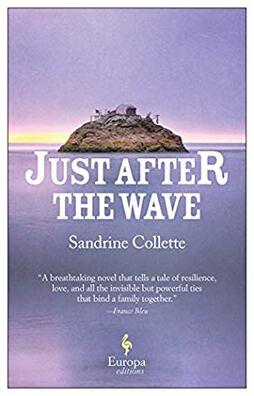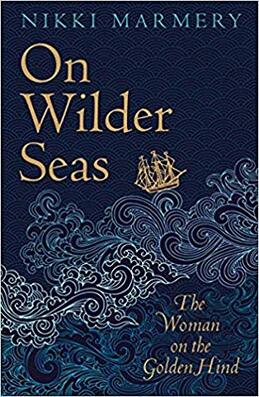Just after the Wave by Sandrine Collette translated
by Alison Anderson
Several days earlier, a volcano eruption triggered a tsunami that destroyed his island homeland, drowning all its inhabitants apart from Louie and his family at the top of the hill. Since then, the waters have been steadily rising, soon to engulf their house too. Their only hope of survival is to launch their small boat and head for the highlands a week’s rowing away. But there isn’t room for everyone, and the parents face a terrible choice.
The novel charts the three remaining children’s shock at their abandonment and their dwindling hope that, as promised in the letter, their father will return to rescue them. Meanwhile, the rest of the family are battered outwardly by raging storms, and inwardly by the torment of leaving the middle children behind.
Sandrine Collette’s previous novel in English, Nothing but Dust, a startlingly honest account of the harshness of life on the Patagonian steppe and the impact of a mother’s inability to love on herself and her sons, was one of my favourite reads of 2018. While I enjoyed Just after the Wave, it didn’t merit such a lofty accolade, perhaps partly because I couldn’t get past a couple having nine children in an age of easy contraception, or the warm welcome in an era of hostility to refugees.
A heart-breaking cli-fi novel about grief, guilt, survival and abandonment, Just after the Wave was first published in French in 2018, Alison Anderson’s translation is published this week by Europa editions who provided my review copy.
On Wilder Seas by Nikki Marmery
Maria capitalises on the rivalry between the different Christian sects to get a berth in the captain’s cabin, one step removed from the brutality on board. But she hasn’t bargained for the external dangers, as the General steers a route northwards through fog and ice, hoping to find the shortcut home to his queen.
Records show that there was a Maria aboard the Golden Hind for nine months in 1579, although nothing is known of her beyond her name. In her debut novel, Nikki Marmery has taken these bare facts to build a fascinating account of Elizabethan exploration, colonisation and survival in harsh times. Having recently reviewed the nonfiction book Wayfinding: The Art and Science of How We Find and Lose Our Way, I enjoyed the insight into early navigation (at a time they could calculate latitude but not longitude).
You can’t read this without rooting for Maria, and for the Native Americans whose lives are about to be shattered. Thanks to Legend Press for my review copy, and for alerting me to Women’s History Month; look out for a post from me on that shortly with another mention of On Wilder Seas.
























 RSS Feed
RSS Feed





















